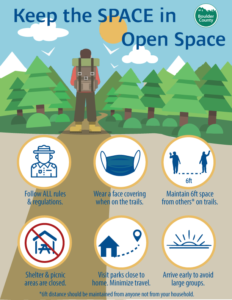Open space agencies remind visitors to practice responsible recreation and stay close to home
Four Colorado Front Range park and open space agencies are seeing instances of trail and natural resource damage as visitation to area public lands has increased over the last month.
With high visitation likely to continue and declining tax revenue likely to decrease overall open space maintenance efforts, a group of Front Range open space agencies want to remind Coloradoans to practice responsible recreation to help protect each other and our shared public lands. They also continue to stress open space visitors need to maintain at least 6 feet of physical distance and wear face coverings while recreating on open space lands.
Recently, Rangers, ecologists and staff members with Boulder County Parks and Open Space, City of Boulder Open Space and Mountain Parks, Denver Parks and Recreation Mountain Parks and Jefferson County Open Space have seen:
- Trail widening and plant damage by visitors walking around muddy trail areas. While open space agencies understand visitors may need to temporarily step off trail to maintain physical distance, they encourage everyone to “keep off the grass and get muddy” and stay in the middle of muddy trails even if no one else is around. If visitors need to maintain physical distance on narrow trails, they should step onto a rock or a bare spot – if possible – to let others pass, then step back on the trail. They should avoid stepping on vegetation and politely announce themselves if they need to pass others.
- Disturbances to sensitive habitat areas from visitors illegally entering wildlife closures and other sensitive areas closed to the public. Open space rangers are encountering more people in wildlife closure and other sensitive closed areas, which can cause significant disturbances to local wildlife. While recreation is an essential component of open space programs, wildlife habitat protection is also a critical function a. The public is reminded to stay out of wildlife closure areas and properties closed to the public, which are marked with signs. Rangers will be strictly enforcing closure violations.
- Visitors walking off designated trails. Open space trail staff members work with wildlife and plant ecologists to create enjoyable visitor experiences and help protect sensitive habitats. Currently, Boulder County, the City of Boulder, City and County of Denver, and Jefferson County maintain over 560 miles of designated open space trails. However, in recent weeks, many visitors have walked off designated trails and have created unmaintained “social” trails that can reduce – or fragment – large habitat areas that many wildlife species need to thrive. The agencies ask all visitors to remain on designated trails.
While the open space agencies have instituted several management actions to address crowding, such as temporary closures at crowded trailheads and full parking lots, they may implement additional closures to mitigate trail and natural resource damage. The park and open space agencies request the cooperation of the public in helping them to maintain shared public lands. To reduce the likelihood of trail closures, the park and open space agencies request visitors:
- Wear a face covering AND maintain six feet of physical distance while on open space trails.
- Stay as close to home as possible and avoid unnecessary travel. If visitors encounter a full or crowded area, they should move on to another area.
- Park only in designated parking areas.
- Visit open space areas in groups of four or less people. Larger groups can impede traffic on area trails and make it difficult for people to maintain social distance.
- Walk through the mud and keep off the vegetation when stepping off trail.
- Adhere to dog regulations for specific trails, pick up after their dogs and remove their trash.
- Stay out of wildlife closure areas and other areas closed to the public.
- Know their limits and not take any risks to help protect first responders.
The agencies also request visitors plan their recreation visits carefully. View designated open space trail maps and closure areas through these websites:
- Boulder County: boco.org/trails
- City of Boulder: OSMPTrails.org
- Jefferson County: Jeffco Open Space Interactive Map
- City and County of Denver: Denver Parks and Recreation Mountain Parks


Comments are closed.